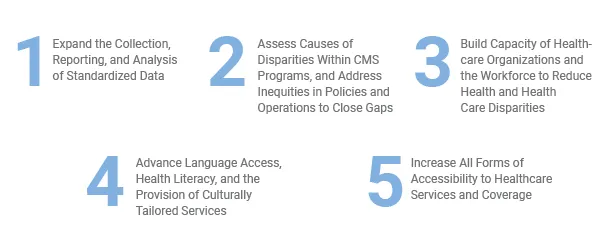We've joined our RTI Health Solutions colleagues under the RTI Health Solutions brand to offer an expanded set of research and consulting services.
Framing The Future Of Equitable Healthcare: CMS Health Equity Conference 2023
The Center for Medicare and Medicaid Services (CMS) held its inaugural Health Equity Conference at Howard University in Washington, DC on June 7-8th. This conference was the first of its kind, bringing together clinicians, researchers, and policymakers to discuss how we can work together to build a more equitable healthcare system for historically under-resourced populations.
The 2 days were packed with many sessions about health equity at CMS and strategies that other stakeholders are implementing to promote and measure equitable care. Below, I highlight some of the key themes and strategies I gathered from the conference.
CMS-wide commitment to health equity
In the spring of 2022, CMS released the CMS Framework for Health Equity 2022-2032. This framework serves as the agencies' decade-long commitment to health equity. The framework served as a foundation for the CMS Health Equity Conference agenda, with each session focusing on 1 or more of the following priorities from the framework:

5 Priorities from CMS Framework for Health Equity 2022-2032
Some important CMS initiatives for promoting health equity include CMMI models like ACO REACH, the Enhancing Oncology Model, and the Value Based Insurance Design Model that are including more equity components such as required health equity plans, equity-based payments, and sociodemographic data collection. Conference attendees also heard about the new birthing-friendly hospital designation that will be published on Care Compare in Fall 2023. This distinction recognizes hospitals that are dedicated to reducing maternal health disparities as attested by the IQR Maternal Morbidity Structural Measure.
Other noteworthy focus areas for CMS this year include post-PHE Medicaid unwinding, creating learning materials related to the cultural and linguistically appropriate services (CLAS), boosting quality measurement and incentives for treating historically underserved populations, and collecting more sociodemographic data in the enrollment process.
Health equity measurement and tracking
Following priorities 1 and 3 of the CMS Health Equity Framework, accurate analysis and tracking of health equity metrics was a major theme of the conference. In a session titled "Measure What Matters: Examining Variation in Health Equity Tracking and Measurement Practices Across Healthcare Systems in the US," conferencegoers heard from 5 health equity measurement champions about their experiences incorporating new metrics into their workflows.
Organizations endorsed incorporating health equity measurement goals into their strategic and operational plans at the highest level of the organization. Then, they narrowed down safety and quality measures to stratify and make the data accessible to providers via reports. This data could be filtered by specific demographic groups, allowing providers to see and act on health disparities in real-time. Lastly, they incorporated incentives for employees and clinics who met measurement targets. Some organizations even incorporated executive dashboards to display quality results internally, reinforcing the idea of a shared goal of measuring health disparities.
Community-backed interventions for health equity
Forming effective and long-lasting community partnerships to address health equity was a prominent theme of the conference that captures all 5 priorities of the CMS Health Equity Framework. In a session titled "Community Powered Health: Igniting Change through Engagement and Community-Led Solutions," we heard from several organizations that have implemented programs to address the specific social needs of their communities while elevating community health workers and volunteers.
The speakers emphasized the importance of building interest and trust in community SDoH interventions by leveraging community members to perform outreach through paid and volunteer positions. One example of an effective community partnership was the Choose Healthy Life program that mobilizes predominately Black faith organizations to perform outreach and health literacy activities about COVID-19. They have built a workforce of community health navigators to aid community members in getting tested and vaccinated for COVID-19. On-the-ground interventions like Choose Healthy Life promote population health and closed-loop care for historically underserved populations.
CLAS and the health equity framework
CMS's work around CLAS fits well into priorities 4 and 5 of the CMS Health Equity Framework. In a session titled "Promoting Health Literacy through Culturally and Linguistically Appropriate Services (CLAS)," we heard from leaders at CMS and other healthcare organizations about how to leverage the National CLAS Standards, perform outreach to non-English speaking populations, and communicate important health information in culturally sensitive ways.
CMS has a wealth of resources online for implementing the CLAS standards, including their Language Access Plan and the CMS Framework for Advancing Health Care in Rural, Tribal, and Geographically Isolated Communities. They have also implemented first-language communication (Pg 10) requirements into the 2024 Medicare Advantage and Part D Final Rule.
"Health Equity is the unfinished business of healthcare."
Working towards transformation
The CMS Health Equity Conference highlighted a wealth of tangible progress towards health equity that has happened over the past few years. While healthcare organizations have made large strides, there is still plenty of work to be done. A full transformation of the US healthcare system will take collaboration and innovation across all sectors. However, in the words of keynote speaker Daniel Dawes, we are too close to fail.
If your healthcare organization is interested in health equity consultation services, please contact RTI Health Advance.
Subscribe Now
Stay up-to-date on our latest thinking. Subscribe to receive blog updates via email.
By submitting this form, I consent to use of my personal information in accordance with the Privacy Policy.